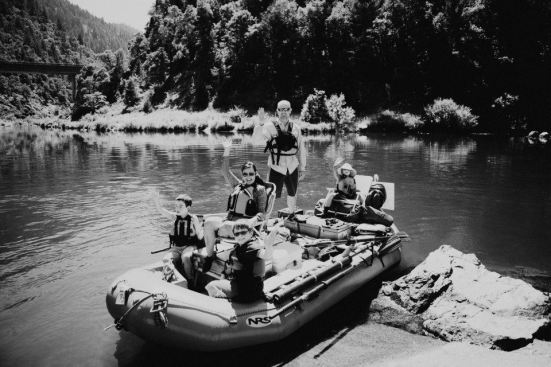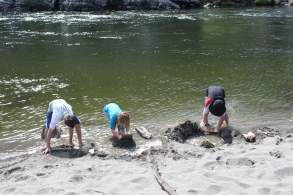Each year we take our three kids on a multi-day white water raft trip. Not the type of trip with a hotel stay and a little rafting during the day, but a fully contained raft carrying everything we need for 3 – 4 days with no access to roads or power. These trips top the list of events we choose to do and create beautiful memories. While thinking about the all different aspects of rafting, I realized there are lessons taking place. Whether the kids know it or not, the skills they are obtaining on our family adventures in the remote world will one day be valuable to them in the working world.
Here are my thoughts:
- Budgets and project planning: Trips require an outlay of cash. For a rafting trip, permits need to be obtained in advance and food and supplies need to be purchased. Usually the trip involves an overnight stay on the way to the destination and fuel for the car. Very careful planning is required to ensure we have everything we will need. There is no running to the store. This is a great opportunity to involve children in understanding a budget, timelines, planning and contingent planning.
- Rapids: White water rafting means there are rapids. This requires several levels of teamwork. River guide books read differently from other maps (they read from the bottom to top) which requires specialized skill sets and everyone has to watch the landscape and interpret what is coming up. There are no mile markers or signs on a river. Preparation for a rapid that we are not familiar with requires scouting and decisions of what to do based on risk; going through the rapid with dad or walking around. This process of making sound decisions based on multiple variables is a future management tool that will guide their career.
- Eddies: An eddy is a river formation that occurs usually when water hits an object like rocks and creates a calm part of the river. Rafts can sit quietly in an eddy and get a break. Sometimes boaters use eddies to simply slow things down and figure out the next step. When tensions mount at work, an “eddy” can give a person the opportunity to regroup and perhaps choose a two-part meeting, something I speak of in my blog “Stop Talking.”
- Handling fear: On our river trips we have experienced getting stuck on rocks in the middle of river, severe weather and bears close to our camp. Each occasion is a teaching lesson on how to handle fear and remain calm. Kids look to the parents and read their actions. The ability to face fears in the workplace in a rational manner is critical.
- Limited resources: A multi day trip means that everything we need has to be on our raft, or we do without. Each person understands how to ration the food and water and care for our critical supplies. Nearly every company is going to have limited resources and workers have to understand how to work within their parameters.
- Complaining gets you know where: Sometimes there is discomfort. Our trips are well designed but we may get caught in a rainstorm, get attacked by mosquitos or have the wind working against us. It is ok to be uncomfortable for a while and complaining about it does not solve the problem. Often workers spend more time complaining than focusing on solutions. Anyone that can redirect others toward solving problems, instead of perpetuating them, will be a positive asset.
- Unplugged: The river means no power, no cell phones, no Wi-Fi and zero video games. Not once, not one time, did the kids ask about their devices or miss them. Everyone needs to unplug once in a while and get off the grid. Teaching your kids that you hold this time together in high regard means they will one day be workers that take meaningful vacations.
- Great stuff happens at sunrise: Waking up with the sun, instead of an alarm clock, is living the best life. Typically it is calm and peaceful. Harvard Business Review did a study on morning people versus evening people. While evening people did have some advantages, morning people tended to be smarter, more creative and have better sense of humor. If regular life doesn’t allow your family to get up at sunrise, it is worth the special occasion of doing so on an adventure trip. Someday they may be lucky enough to have a job that they can’t wait to get up for.
For kids, their worlds are small. Any opportunity to take them on an adventure based trip, whether rafting, hiking, sailing or biking, is worth the effort to get there. The lessons taught are far greater than texts and classrooms and also enormously important when they begin experiencing life away from home.

